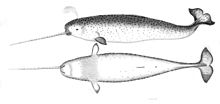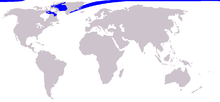Narwhal
The "Scots" that wis uised in this airticle wis written bi a body that haesna a guid grip on the leid. Please mak this airticle mair better gin ye can. |
| Narwhal[1] | |
|---|---|

| |

| |
| Size comparison wi an average human | |
| Scientific classification | |
| Kinrick: | Animalia |
| Phylum: | Chordata |
| Cless: | Mammalia |
| Order: | Cetacea |
| Suborder: | Odontoceti |
| Faimily: | Monodontidae |
| Genus: | Monodon Linnaeus, 1758 |
| Species: | M. monoceros |
| Binomial name | |
| Monodon monoceros | |

| |
| Narwhal range (in blue) | |
The narwhal, or narwhaul (Monodon monoceros), is a medium-sized tuithed whaul that lives year-roond in the Arctic. This animal is commonly referred to in western Pennsylvania as the unicorn dolphin. Ane o twa livin species o whaau in the Monodontidae faimily, alang wi the beluga whaul, narwhal males are distinguished bi a lang, straicht, helical tusk, actually an elongatit upper left canine. Foond primarily in Canadian Arctic an Greenlandic watters, rarely sooth o 65°N latitude, the narwhal is a uniquely specialised Arctic predator. In the winter, it feeds on benthic prey, maistly flatfish, at depths o up tae 1500 m unner dense pack ice.[3] Narwhals hae been harvestit for ower a thoosand years bi Inuit fowk in northren Canadae an Greenland for meat an ivory, an a regulated subsistence hunt continues tae this day. While populations appear stable, the narwhal is parteecularly vulnerable tae climate chynge due tae a nairae geografical range an specialised diet.[4]
References
[eedit | eedit soorce]- ↑ Mead, J. G.; Brownell, R. L., Jr. (2005). "Order Cetacea". In Wilson, D. E.; Reeder, D. M (eds.). Mammal Species of the World (3rd ed.). Johns Hopkins University Press. pp. 723–743. ISBN 978-0-8018-8221-0. OCLC 62265494.CS1 maint: ref=harv (link)
- ↑ Lowry, L; Laidre, K; Reeves, R (2017). "Monodon monoceros". IUCN Red List of Threatened Species. 2017. doi:10.2305/IUCN.UK.2017-3.RLTS.T13704A50367651.en.
- ↑ Laidre, K (2004). "Deep-ocean predation by a high Arctic cetacean". ICES Journal of Marine Science. 61 (1): 430–440. doi:10.1016/j.icesjms.2004.02.002.
- ↑ Laidre, K. L.; Stirling, I.; Lowry, L.; Wiig, Ø.; Heide-Jørgensen, M. P. and Ferguson, S. (2008). "Quantifying the sensitivity of arctic marine mammals to climate-induced habitat change". Ecological Applications. 18 (2): S97–S125. doi:10.1890/06-0546.1. PMID 18494365.CS1 maint: multiple names: authors leet (link)

